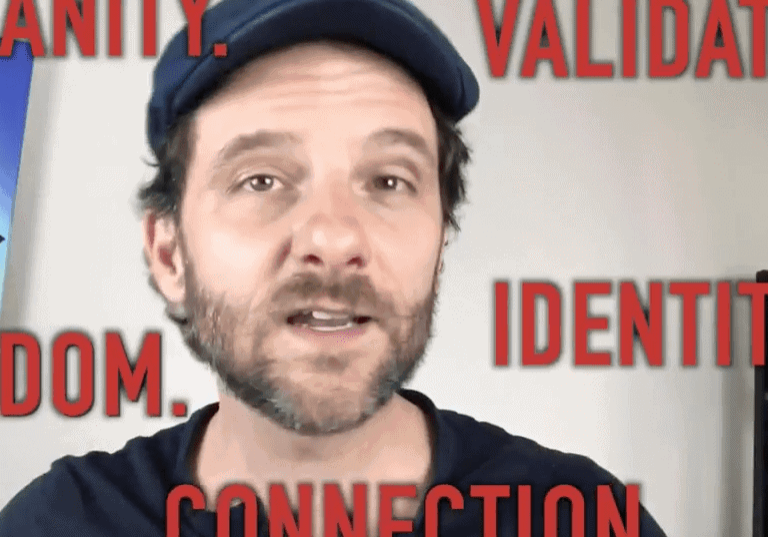♦◊♦
A few years ago, I was shocked to discover I’d spent a lifetime (unknowingly) allowing one especially critical boundary to be violated by the women I loved, over and over.
Naturally, I routinely violated this same boundary for them, too.
Had I been aware (and able to stand for this boundary) I’m convinced! I would have been able to actually enjoy relationships, rather than fear them as the nightmares they inevitably became.
Sadly, it didn’t occur to me that I – a man – should even have boundaries, except the “obvious” ones of course.
For the shallow-masculine world around me insisted there were basically only 3 ways a woman could violate me:
- She cheats on (lies to) me
- She disrespects (rejects) me
- She takes tangible resources (money, things, time) from me without my permission.
That’s it.
Otherwise, I was completely sold into the (absurd) idea that a man is supposed to be tough, invulnerable, invincible, able to “handle” (whatever that means) anything difficult that comes his way … least of all a woman!
Boundaries? … Women need boundaries. Not me! (so I thought)
Thus I swam for decades in the deep, mysterious oceans of intimate relationship, blinded and unprotected from all kinds of painful boundary violating behavior, from the subtly upsetting (testy mermaids nipping at my toes) to the excruciatingly painful (great white sharks roaring up from the depths to swallow me whole as I thrashed about desperate for survival!).
But there was one specific boundary violation that kept happening over and over, and I’ve seen it since, countless times as a Relationship Coach the last 7 years. This unassuming little sea creature has a thousand microscopic spiny needles that quietly inject poison into intimacy, rotting out from the inside all feelings of trust and safety.
This is that one boundary violation:
When one partner assumes, with near or complete certainty, that they know what the other is thinking or feeling, or what they should be thinking or feeling.
Today, as a relationship coach, a significant part of my work is teaching people how to create and maintain healthy boundaries in ways that leave both partners feeling heard, honored, and respected.
Whether I’m working with individuals or couples, we’ll work through all variety of boundary issues, from porn to infidelity, from work-life imbalances and co-dependency, to commitment confusions and all the ways one might give their power away to the world around them.
But this one boundary violation shows up in every relationship dynamic.
Here are ways in which it emerged from the mouths of my past loved ones, and from my mouth, too:
“You don’t really care about me.”
“You obviously don’t want to spend time with me.”
“You clearly want to be with someone else.”
“You should never have done X because I sure wouldn’t have done X!”
“You obviously don’t know what’s best for you.”
“You are clearly not as spiritual/aware/conscious/wise/mature as I thought you were.”
“You shouldn’t feel X; it doesn’t make any sense.”
“You only did X to satisfy your ego.”
“You don’t care about X as much as I do.”
… and on and on.
Notice these all start with “You” – though they can be cleverly disguised by the conniving ego as “I” statements, too: “I don’t feel like you care about me.”
Regardless, these are all conclusive declarations that, “I know what you’re thinking or feeling (or should be).”
Here’s a more revealing way of saying the same thing:
“I can’t see, hear, or feel the real you right now because the conclusions I’m creating in my mind about you are in the way.”
How’s that going to inspire connection? It can’t, and never does.
What it more commonly does is incite defensiveness, confusion, anger, resentment, shut down, withdrawal, disconnection.
Today, I understand my partner (or I) would only ever say such things out of pain and fear, when she, herself, feels deeply unseen or heard; when she’s desperate for loving reassurance that I will hold her experience/feelings/perspective as valid and won’t leave her alone in the pain.
I never knew that before.
It still sometimes crushes me to look into my past, to see with more mature eyes the anguished faces of women I was trying to love. I can see now both the anger and the sadness in their eyes, betraying a profound ache to feel seen and heard by me.
Yet in the face of desperate attempts to have certainty, by insisting they knew my agenda – my thoughts and feelings, my why’s, my inner world – all I could ever do was react poorly, defensively arguing for the right to exist. As if my entire being would be swallowed up by their conclusions that I knew missed the mark.
Here is what I should have done, instead – an effective 2-step response that would have saved us both:
1. Respectfully, lovingly, stand up for this boundary:
“Please stop saying you know what is true for me (what I’m thinking, or what I’m feeling). I’m not going to continue this conversation until you stop, and allow me the space to have my own experience.”
2. Offer the reassurance she’s really seeking.
“I really get that you’re hurt (upset, mad, scared, confused, etc.). I’m here with you, and we’ll figure this out together.”
Because I’ve been practicing this for years now, and teaching this to my clients, I know what can happen next: Genuine curiosity and moments of real connection.
PRACTICE
Notice the next time someone – whether intimate partner, friend, colleague, or family member – makes an assertion that they know what you’re thinking or feeling (or what you SHOULD be).
This could reveal itself in a thousand ways:
“You should want to go to X with me.”
“You clearly did X because you’re inconsiderate/ignorant/ashamed/confused/insensitive …”
“You should feel ashamed/embarrassed/disgusted/happy/relieved ….”
“You should see this from X perspective.”
“Why are you single?” (no one ever asks: “Why are you in a relationship?”)
To be sure, sometimes people can actually be helpful when offering different perspectives, for example. Often, though, it’s not string-free “help” they’re offering; rather, they’re attempting to enroll you in their own worldview so they don’t feel so alone in it, themselves.
Regardless, if it doesn’t feel helpful, don’t attempt to defend yourself by trying to convince them of what you’re thinking or feeling. Instead, simply ask them in this very moment not to assume they know what is (or should be) happening for you.
If you’re not too emotionally charged you might thank them for trying to offer insight (or whatever they’re trying to offer), even as you stand up for this boundary.
I find acknowledging people for their good intentions, even if their execution be poor, goes a long way towards maintaining respect and partnership even through the most difficult of disagreements.
If you’re the one being asked to stop, you could simply say, “My apologies. I didn’t mean to assume I know your inner world.”
Then get curious. Invite them to share what actually IS going on for them, and trust they’re speaking truth to the best of their capacity in that moment. (if you can’t trust that, it ain’t likely to be a meaningful conversation, anyway!)
Ultimately, whichever end of this you’re on, the point is to open up space for curiosity, for curiosity draws people together.
Curiosity creates connection. Drawing conclusions about each other tends to destroy it.
Learning to honor this one boundary can profoundly improve the quality of your relationships. It sure has mine.
♦◊♦
* What does this bring up for you? Please say so in the comments. (I read all of them)
** Learn how to Make Love Better by enrolling in one of Bryan’s “Love Mastery University” courses @ https://bryanreeves.com/programs/
- 253shares
- 251Facebook
- 0Twitter
- 0Pinterest
- 2Email





I ruined my marriage because he was completely out of touch with his emotions and I told him what his emotions clearly were. Now he’s gone, divorcing me, and there’s nothing I can do about it. I’ve apologized and he is like “great, use that in your next relationship because I have zero want to be with you.”
I was so tired of being ignored and not valued and he was so tired of being told what he was thinking and feeling. I asked him to work on the marriage with me and he is refusing.
Do I just give up?
Always remember relationships are NOT 50/50 … they’re 100/100 … BOTH people make the experience. In my experience it is NEVER one persons “fault,” but rather a co-created experience (CO-conspiracy, if you will). Don’t be hard on yourself. We’re all learning as we grow.
My husband CONSTANTLY crosses this boundary(didn’t know there was one), He constantly accuses me of going to lecture him as soon as I open my mouth if I disagree with him about something he’s said. I’m always wrong, I’m always to blame, regardless if I was the one to say something wrong.
For some Neanderthal, Narcissistic, Sociopathic, Bi-Polar “men”, it will always be someone else’s fault, but never theirs. Whether it’s work or relationships.
Sounds awful.
Very helpful. I benefit from what others have learned through their experiences – like what you have shared here. I haven’t had this experience but I have found that for me, asking what is going on with someone rather than projecting is proving to be an approach that leads to the other feeling validated, seen and respected.
Absolutely Lori!
Yes Bryan yes, it is such a profound insight out intimate human relationships!
Thanks Rajiv 🙂
Thanks for this! I have a chronic illness and I hear from my partner often about what online information has to say about my condition, limitations, capabilities, experiences (including emotions and sexuality) … as in I’ve read up on it so I know what’s going on with you … Uh, no you don’t. Infuriating! Really appreciate the framework for addressing it. I’ve been at a loss.
You’re welcome. As well intentioned as I’m sure your partner is, I really get that what you need more than “facts” from him is “emotional presence.” He probably won’t understand what that means, and he may not be the one to give you that fully, but I might suggest using a sentence like this to stop him in his tracks and just be PRESENT with you:
“I really appreciate your concern and your attempt to help me get through this. However, I don’t need more information from you. What I really need is just your patience, and willingness to just listen to me (or just sit and be with me) when this comes up for me.”
Or something along those lines. He just needs to know that you need more than mere information from him to really get through this.
Is that helpful?
Thank you for this insight..it seems to be the most normal thing to listen to each other for real….but it s not. Good intentions are not worthy..but trying to be patient in communication is really valueable…to built a true bond we maybe don’t know yet about its possibility to excist. Do you know the book Momo by Michael Ende? It s a lot about the magic a listener by heart can set free ☆☆
I don’t know that book but sounds like essential reading 🙂
Hi Brian. Thanks for writing this and bringing up boundaries over and over. I really resonate with what you wrote about as a man feeling like I should be able to handle whatever is thrown at me, especially by a woman. I struggle with what I understand of the David Deida view on that. I really resonate with not having set strong enough boundaries with recurring hurtful communication behaviours, and getting consistently hurt and then shutting down and withdrawing / the relationship failing. It’s a big challenge, and for me very related to what you’ve written elsewhere about not feeling like my feelings are really *that* worthy of being heard and validated. So in the face of conflict or the crossing of what should have been a boundary, I choose to let my feelings go as if they don’t matter. It’s rough man. Thanks for bringing more awareness to it for me.
Totally with you, Liam.
This is a great post. It drives me nuts when people tell me what I’m thinking or feeling.
I’d like to go a step further and ask about the person who won’t share themselves with you? I assume your answer will be to run! That person is probably emotionally unavailable. I was close friends with, and interested in dating a guy for over a year. I’d ask him how he felt and asked about specific life events.
I would recurved canned or vague answers or he’d refuse to answer my curiosities at all and say, “I will never share that.” I wasn’t asking awkward deep questions. Some were. But after knowing someone and spending time with someone and yes, we were “intimate” with one another, one would think the other person would open up a little bit.
I began to feel unsafe. My mind was trying to piece together who he was. I’d tell him how i felt and he’d say, “I hear you. I understand. Thank you for sharing…” things like that. I know his intent was a positive one. But the more I heard the same thing over and over, the more I felt unsafe and I started making assumptions about who he was. My mind was trying to piece together this person with whom I was spending so much time.
I think what I’m looking for is validation. It’s normal to have curiosity about a person you care for, right?
I ended up leaving out of sheer frustration. I was beginning to blame myself and feel bad about myself in that relationship. He knew all about me. And I knew so little about him.
Curiosity is great, if the other person meets you half way.
I told him in the end, I really liked you and I know guy had feelings for me too. But I felt like you were never going to let me in. I wish you were better. (A little thing I say often that is kind of tongue n cheek)
He replied, thank you for your note. I wish i were better too. I hope youre having a great day.
The end.
It certainly doesn’t interest me to spend much time with someone who can’t (won’t) share what’s really happening for them. For all kinds of reasons!
I love that boundary article. One of the best things I’ve ever read
Honored to know it ????
Thanks Bryan. Again, good food for thought and self reflection. I’ll be reading this a couple more times…
Youth is wasted on the young and Wisdom is wasted on the Elderly. Reach inward before it is too late!
Hey Dad. This is just a bizarre comment to leave on your son’s blog.